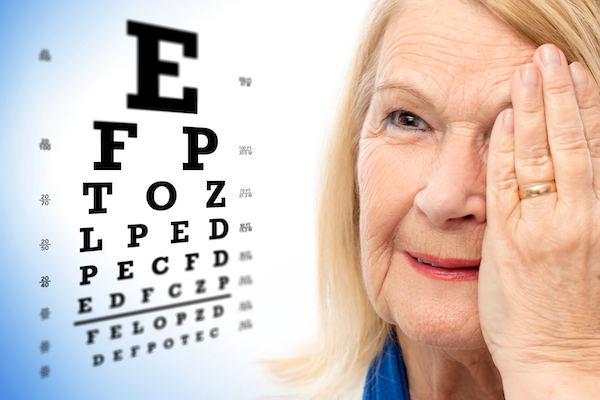Health Eyesight As You Age

Aging is one of the most common reasons for bad eyesight and blurry vision. When we age, it is harder for us to see the world as crystal clear as we used to when we were younger. While minor vision changes are normal as one grows older, making regular eye doctor appointments is advisable to prevent the issue from escalating into a major eye problem.
The upsetting part about age-related eye disorders is that most of them start painlessly without any red flags, and they only come to notice when the problem intensifies. For that reason, all older adults need to be vigilant about their eye health and visit a certified eye professional regularly. May is Healthy Vision Month, a perfect time to review your own eye health.
Why should the elderly be extra cautious about their eye health?
While regular eye doctor appointments are essential for people of all ages, the older generation should take extra care since they are at a higher risk of developing eye problems, including presbyopia, glaucoma, dry eyes, macular degeneration, cataracts, and temporal arteritis. In addition, these eye disorders increase their chances of falls and injuries. The elderly are already in danger of frequent falls due to lack of physical strength, and an eye problem is likely to worsen this problem.
Not to mention that weaker eyesight will hinder active lifestyle. Impaired vision leads many older adults to stay home more than they would like, making them more susceptible to loneliness and a sedentary lifestyle.
Lastly, being careful about eye health is crucial for older adults because eye problems can indicate an underlying disease. Poor vision leads to accidents and mobility issues; therefore, preventing vision loss is crucial to ensuring a healthy lifestyle.
Here are some tips for maintaining healthy vision:
1. Regularly visit an eye professional
The importance of periodically visiting an ophthalmologist cannot be overemphasized — especially when it comes to seniors. An eye specialist will thoroughly examine if your eyes are working as they should and inspect them for potential problems.
You can steer clear of age-related eye problems only by regularly visiting an eye doctor. If they find any issue developing, they will professionally treat it to prevent it from escalating and causing permanent vision loss. They will also conduct a pupil dilation test, which is crucial for the elderly even if they have a perfectly working pair of eyes — consider taking this eye exam once every year if you are above 50 and twice a year if you are 60 years old or above.
2. Wear your prescription glasses
More often than not, older people forget or avoid wearing their prescription glasses. If they have relatively better vision, older people sometimes turn to their glasses only when the vision is extremely blurry. If you are one of those older adults, work on changing this habit and start wearing your prescription glasses, as told by your eye doctor.
Not wearing prescription glasses will cause eyestrain and further impair your vision, which will lead to all the problems we talked about earlier in this blog. Even if you can read reasonably well without the glasses, do not stop wearing them altogether, as this can deteriorate your condition. Additionally, wear sunglasses to block the UV radiation and protect your eyes. Do not forget to take a 20-minute break from the screen in between when you are working on your computer.
3. Frequently check your blood pressure and sugar level
Many are unaware that high blood pressure (hypertension) and high blood sugar (hyperglycemia) can impair your vision. Your blood pressure and sugar levels impact the blood vessels of your eye. If your blood pressure and glucose levels are not normal, it can cause adverse changes to your eyesight.
Therefore, keep checking your blood pressure and blood sugar level. If there is any abnormal change, see a doctor. Lead a healthy lifestyle, exercise regularly, and make smart food choices to have a healthy heart, thereby, stronger eyesight.
Dealing with vision loss
In some cases where adults suffer from incurable eye problems, vision loss is inevitable. Such older adults are at a high risk of accidents and require constant support to perform day-to-day tasks. To alleviate their difficulty, there are numerous low-vision rehabilitation programs that can help restore functional ability, regain independence, and improve the quality of life while learning various techniques to efficiently perform daily activities in spite of vision limitations.
Stay Safe with LifeFone Medical Alert Systems
LifeFone understands the challenges that older adults with poor vision face and the worries it causes to their family members. Therefore, we have several medical alert systems that allow you to quickly access medical help whenever needed — your poor eyesight will never hinder you from getting medical assistance urgently. Our alert systems enable the elderly who are dealing with eye problems to call for help by simply pressing a button. Our newest voice-in pendant system comes with an optional caregiver app that allow family members and friends to view a subscriber’s current location and track first motion of the day. For the subscriber, the app tracks steps, notifications when the battery is low and has a “find my device” feature.
- How Seniors Can Feel Empowered in a Digital World with Accessible Technology
- February Is American Heart Month
- Thriving as a New Caregiver: Self-Care Secrets Revealed
- Bridging the Gap: Supporting Seniors Without Nearby Family
- Distance Caregiving Simplified: Modern Strategies for Compassionate Support
FREE BROCHURE Today!
